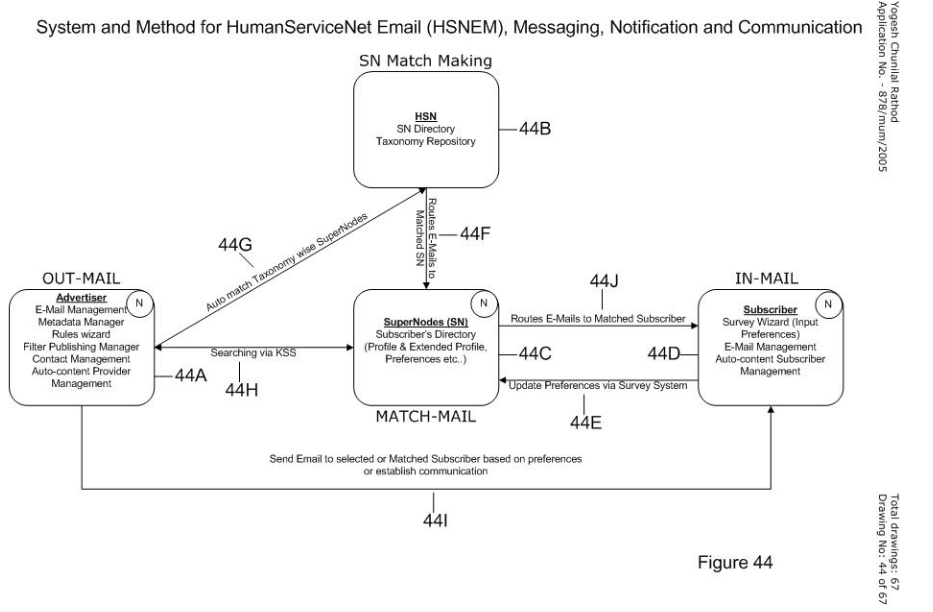| Patent troll or paper tiger |
| Written by Sue Gee | |||
| Monday, 18 July 2011 | |||
|
An Indian start-up has sent out notices to all the mobile development companies it can think of warning them that they could be in violation of its soon-to-be-granted patent.
News that Kootol, co-founded in 2010 by brothers Yogesh and Vijay Rathod, had taken this action was announced in a press release referring to its US Patent application number 11/995343, which: covers core messaging, publication and real time searching technology and effect whole products & services. The companies involved form a fairly impressive list of most of the major players in web development, well able to defend themselves and in doing so crush the opposition, to plus a few smaller ones who may have come to Kootol's attention simply because they are already victims of patent lawsuits and thus more vulnerable. The full list from the press release is: Microsoft, Yahoo, Google, Apple, Bharti Airtel Ltd., Webaroo Technology (India) Pvt. Ltd., Amazon, AOL, Nokia, Bebo Inc., ExactTarget Inc., Ford Motor, Foursquare Inc., IBM, Linkedin, MySpace, NING Inc., Research In Motion Inc., Quora Inc., Salesforce.com Inc., Seesmic Inc., Siemens Enterprise Communications Inc., Sina.com Technology Co. Ltd., StatusNet Inc., PopBox Inc., Twitpic Inc., Peek Inc., The Iconfactory Inc., Ubermedia Inc., Yammer Inc., Facebook and Twitter. More worryingly the announcement continues: In addition to above companies we are also in process of sending informative notice to several other companies and developers, who are using our technology, to convey them to examine & settle the matter. We also welcome all the companies and developers for the licensing. Although Kootol's announcement continues to use its the original application number from when it was filed in 2006, it recently had the status of having a "Notice of Allowance" which meant that the patent would be granted on payment of a fee to USPTO. Why Kootol doesn't refer to it as US Patent 20100030734 is a question I can't answer. While the announcement has led to a flurry of news items that suggest that this thinly disguised blackmail is having some effect in disturbing the already harassed community of mobile developers, it has also led to many cries of "surely they can't be serious" by those who have looked at the patent application and noticed that any claim to have invented one- and two-way messaging in 2005 can be easily overturned by reference to prior art citing technology that has roots at least as far back as the 1980s.
While what Kootol is doing is patently absurd (pun intended) it does highlight some of the factors in what has become a real crisis for anyone in the mobile development arena. One is that USPTO, by its own admission unable to deal with the number of applications it receives and is no longer evaluating them. Instead it allows patents through leaving it to the courts to sort out out which are valid in costly lawsuits. The situation is exacerbated by the fact that the courts continue to defer to the expertise of the patent office. A situation of positive feedback if ever there was one! By choosing targets that include Microsoft and Apple, Kootol have probably exposed the weakness of their case. Not all patent trolls are as easy to dismiss. Lodsys is one that really does have mobile developers running scared, with many UK developers deciding to pull out the US app market for fear of patent lawsuits, according to Charles Arthur of The Guardian, who initially drew attention on May 13, 2011 to the way in which Lodsys is pursuing developers for infringement of four patents relating to in-app purchases, interactive online ads, online help and subscription renewals that it bought from the original inventor whose patent was granted in 1999 and is valid for at least another 15 years. On his FOSS patents site, Florian Mueller has several posts relating to the way in which Lodsys is going after "little app developers" who can't afford to defend themselves including one that suggests how to deal with the situation which he describes as "getting out of control".

|
|||
| Last Updated ( Monday, 18 July 2011 ) |
 (click in diagram to enlarge)
(click in diagram to enlarge)